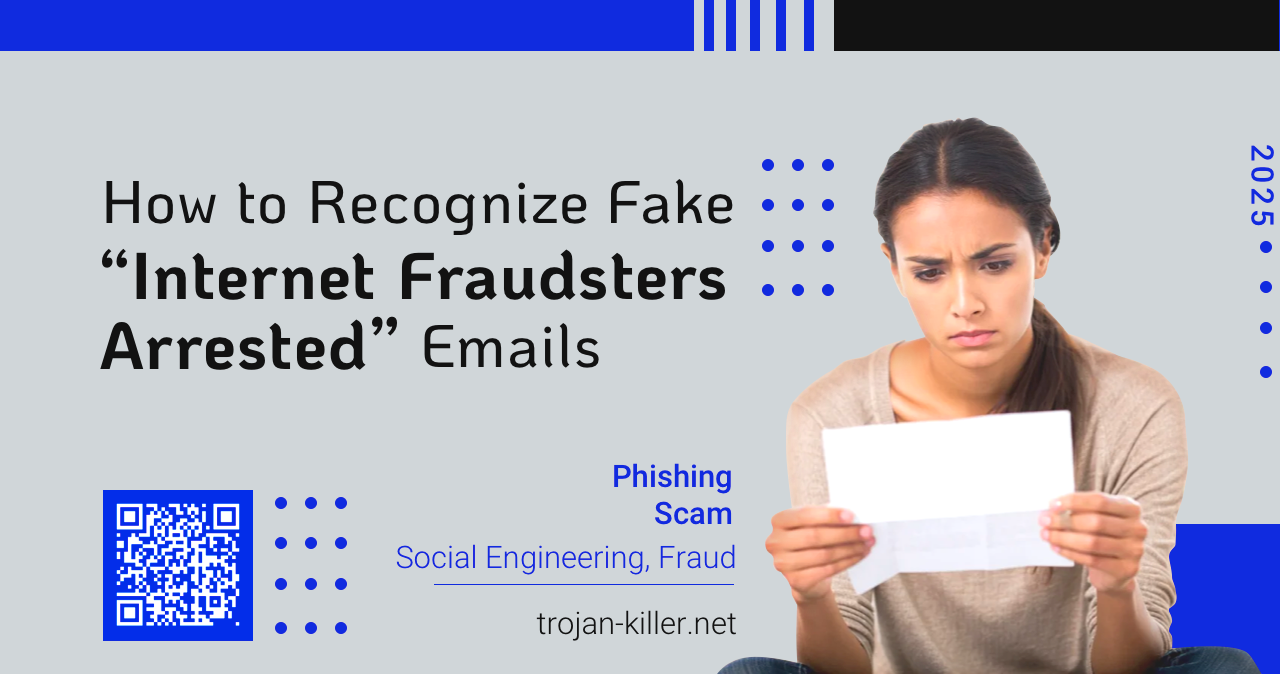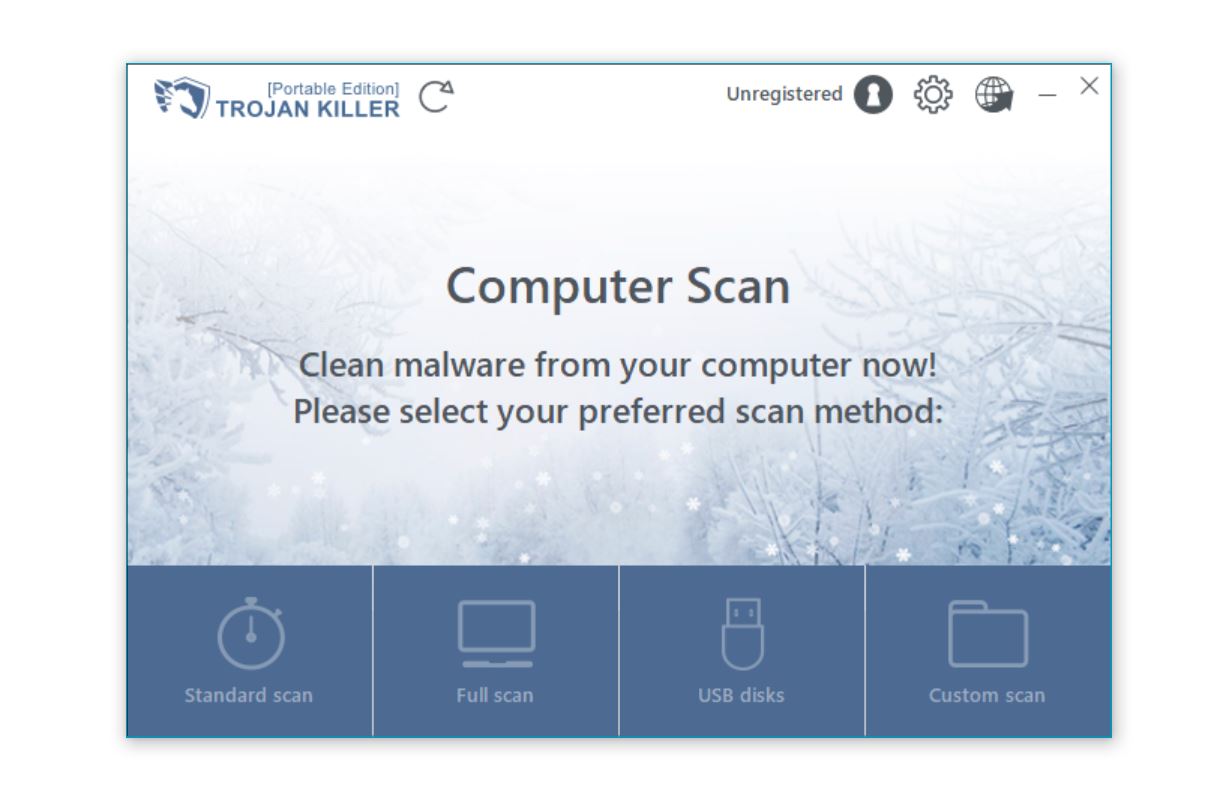Physical Address
Lesya Kurbasa 7B
03194 Kyiv, Kyivska obl, Ukraine
Physical Address
Lesya Kurbasa 7B
03194 Kyiv, Kyivska obl, Ukraine

Among the many phishing schemes circulating online, the “Internet Fraudsters Arrested” email scam stands out for its audacious claims and sophisticated social engineering tactics. This guide explores how to identify this dangerous scam that promises millions in compensation for alleged previous fraud victimization, and provides actionable steps to protect yourself.
| Name | Internet Fraudsters Arrested |
| Threat Type | Phishing, Scam, Social Engineering, Fraud |
| Fake Claim | Scammers who have defrauded the recipient were arrested, and the Spanish government is required to pay 2 million EUR in compensation |
| Disguise | Supreme Court of Spain and other Spanish government entities |
| Related Email Subject | “From the Crime Fraud Investigation Department Spain” |
| Impersonated Role | American detective working with Spanish police on cybercrime |
| Symptoms | Unauthorized online purchases, changed online account passwords, identity theft, illegal access of the computer |
| Distribution Methods | Deceptive emails, rogue online pop-up ads, search engine poisoning techniques, misspelled domains |
| Damage | Loss of sensitive private information, monetary loss, identity theft |
The “Internet Fraudsters Arrested” email scam is a deceptive message claiming to be from an American detective working with the Spanish police on cybercrime and internet fraud. The email falsely notifies recipients that online scammers who had previously defrauded them have been arrested and charged in court.
According to the fraudulent message, the Spanish courts have ordered the government to compensate victims with a substantial sum – specifically, two million euros. Recipients are instructed to contact a named barrister to claim this supposed compensation.
It must be emphasized: all information in this email is completely false. The message is not associated with the Supreme Court of Spain or any legitimate Spanish government entities. This is a sophisticated social engineering attempt designed to trick recipients into revealing sensitive personal and financial information.
Below is an example of an actual “Internet Fraudsters Arrested” phishing email:
Subject: From the Crime Fraud Investigation Department Spain.
From the Crime Fraud Investigation Department Spain.
This is Roger Louis, United States detective working under Spanish police on Cyber Crime and Internet Fraud.
Be informed that the internet fraudsters who defraud you have been arrested and charged to court, last Friday was the final judgement, The court has ordered the Spanish Government to pay you compensation and damages for all the money you lose to those fraudsters, in which the crime are committed by South Americans and Africans living over here in Spain.
This is to notify you that The Supreme Court of Spain has ordered the Spanish Government to pay you compensation and damages, The sum of Ђ2,000.000.00 {Two Million Euros ) has been approved to you in order to compensate you for all the money you lose to those internet fraudsters in Spain.
The Policнa Nacional Crime Fraud Investigation Department Spain is very pleased to inform you that your information has been passed to Barrister George Hernбndez for immediate transfer of your compensation funds from the Spanish Government.
Barrister George Hernбndez will help you claim your compensation fund from the Spanish Government, You should contact Barrister George Hernбndez on this email address below.
Contact person : Barrister George Hernбndez from Principal Attorney George Hernбndez & Asociados Corporate and Finance Law Firm Madrid, Spain.
Contact email: ( barrjhgeorge7798@gmail.com )
Contact Address- Address- Avda Reina Victoria 58 – Esc. 1, 1єA 28003If you are interested in receiving the compensation funds Ђ2,000.000.00 – Two Million Euros, You should contact Barrister George Hernбndez on this email address: ( barrjhgeorge7798@gmail.com ), He will direct you on how to receive your funds.
When contacting the Barrister, Please ask for his ID Card, for you to be sure you are in contact with the right person.
Thank you and Congratulation in advance
Best Regards
Roger Louis
United States detective working under Spanish police on
Cyber Crime and Internet Fraud.
Note the telltale signs of fraud in this email: inconsistent formatting, strange character encoding (Ђ instead of €, “Hernбndez” with an incorrect accent mark), a generic Gmail address for a supposed barrister, and the implausible scenario of an American detective working for Spanish police contacting random email recipients about compensation.
Source: Analysis of “Internet Fraudsters Arrested” phishing emails by Trojan Killer researchers, 2025
The “Internet Fraudsters Arrested” scam follows a well-established pattern designed to manipulate victims through false hope and authority intimidation:
If the recipient responds, the scammers will typically proceed to request sensitive personal information or payment of “fees” to facilitate the supposed release of funds. These fees might be disguised as taxes, processing charges, legal costs, or other plausible-sounding expenses.
The personal information requested may include:
Victims who engage with these scammers often experience a series of escalating requests for payments, with the promised compensation perpetually just one more fee away from being released.
The “Internet Fraudsters Arrested” scam is part of a larger category of “advance fee fraud” schemes. Similar scams include:
All these scams share common elements: promises of unexpected financial gain, impersonation of authority figures, urgent calls to action, and eventual requests for personal information or money.
Source: Analysis of scam campaign response rates, International Association of Cybersecurity Professionals, 2025
While the “Internet Fraudsters Arrested” scam can appear convincing at first glance, several red flags can help you identify it:
For enhanced protection against phishing and fraudulent emails, we recommend using Trojan Killer for Windows, which includes anti-phishing protections to identify and block suspicious messages.

If you’ve already responded to an “Internet Fraudsters Arrested” email or similar scam, take these immediate actions:
The “Internet Fraudsters Arrested” scam can be a gateway to several other types of cybersecurity threats:
Advanced fee fraud chains: Once victims engage with these scammers, they often find themselves caught in a series of escalating fee requests, with each payment supposedly being the final one needed to release funds. This psychological manipulation can lead victims to invest significant amounts before realizing they’ve been defrauded.
Identity theft risks: The personal information collected through these scams can be used for comprehensive identity theft. In many cases, scammers require copies of official identification documents that provide all the details needed to commit various types of fraud, similar to the data targeted by information-stealing trojans like Emotet.
Malware distribution: Some versions of these scams include attachments purportedly containing “official documents” about the compensation or court orders. These attachments may contain malware designed to steal additional information or compromise the victim’s computer security, enabling attackers to use the same tactics seen in banking trojan campaigns like TrickBot.
Targeted follow-up attacks: Victims who respond to these scams are identified as susceptible to social engineering and may be targeted for more sophisticated attacks in the future, including highly personalized spear-phishing attempts that could lead to ransomware infections such as LockBit 4.0.
These emails are sent in mass campaigns to thousands or even millions of email addresses that cybercriminals have collected from various sources. Receiving such an email doesn’t mean you’ve been specifically targeted – scammers send these messages widely, hoping that some percentage of recipients will respond.
No. This is a false claim designed to create a false sense of relief and hope. If you were actually a victim of fraud and the perpetrators were arrested, you would be contacted through official channels by the law enforcement agency handling your case, not through an unsolicited email from an unknown sender.
No. Responding to the email confirms to the scammers that your email address is active and that you’ve shown interest in their scheme. This will likely lead to increased targeting and more sophisticated follow-up attempts. Never respond to suspicious emails.
If you’ve shared identification documents, account details, or other sensitive information, you should take immediate steps to protect yourself. Contact relevant financial institutions to secure your accounts, consider placing a fraud alert on your credit report, and monitor your accounts for suspicious activity. If you provided government ID information, you may need to contact the appropriate agencies to report potential identity theft.
Government agencies typically communicate about fraud cases and potential compensation through official channels, including formal letters on official letterhead, court-appointed administrators, or established victim compensation programs. They do not initiate contact through unsolicited emails promising large sums of money, nor do they request upfront fees to release compensation funds.
The “Internet Fraudsters Arrested” email scam represents a sophisticated form of social engineering that combines false hope with the impersonation of authority figures. By understanding the tactics used in these scams and learning to identify their characteristic red flags, you can protect yourself from becoming a victim.
Remember the golden rule: if an unexpected email promises significant financial gain with minimal effort or investment on your part, it’s almost certainly a scam. Legitimate compensation for fraud victims follows established legal processes and does not require victims to pay fees or taxes in advance to receive their funds.
Stay vigilant, verify communications through official channels, and maintain healthy skepticism toward unsolicited emails promising financial windfalls from unexpected sources.